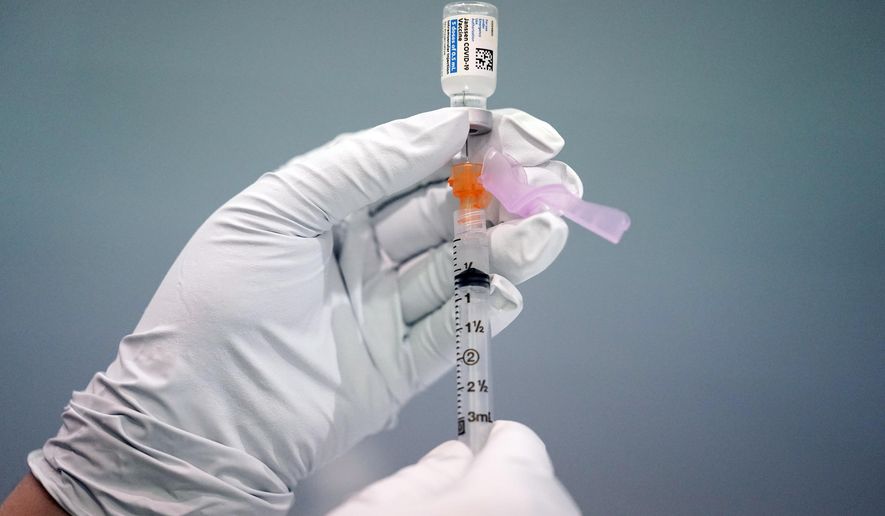Federal health regulators on Monday said they will add a new warning to the Johnson & Johnson coronavirus vaccine about a serious but rare side effect in which the body’s immune system attacks its own nerves, according to reports.
There have been 100 preliminary reports of the disorder, called Guillain-Barré syndrome, have been detected out of nearly 13 million doses that have been administered, the Food and Drug Administration said. Among these reports, 95 of them were serious and required one hospitalization, the agency said, and there was one reported death.
The cases have mostly affected men, many 50 years and older, and appear about two weeks following vaccination, the Associated Press reported.
“Although the available evidence suggests an association between the Janssen vaccine and increased risk of GBS, it is insufficient to establish a causal relationship,” the FDA said in a statement. “No similar signal has been identified with the Moderna and Pfizer-BioNTech COVID-19 vaccines. FDA continues to work with its partner in vaccine safety surveillance, the CDC, to monitor reports of GBS following vaccination with the Janssen COVID-19 Vaccine.”
The Center for Disease Control and Prevention said it would seek the advice of an independent board of vaccine experts and ask them to review the issue at an upcoming meeting.
Despite the newest blow to the one-shot vaccine, the FDA said the J&J vaccine’s “known and potential benefits clearly outweigh the known and potential risks.”
“In the United States, nearly all COVID-19 hospitalizations and deaths are now occurring in unvaccinated people. The risk of severe adverse events after COVID-19 vaccination remains rare. Everyone age 12 years and older is recommended to receive a COVID-19 vaccine,” said Kristen Nordlund, CDC spokesperson.
The FDA added J&J vaccine’s revised fact sheet for recipients and caregivers says that vaccine recipients should seek medical attention immediately if they develop any of these symptoms after receiving the shot: weakness or tingling sensations, especially in the legs or arms, that’s worsening and spreading to other parts of the body; difficulty walking; difficulty with facial movements such as speaking or chewing; double vision or inability to move eyes; or difficulty with bladder control or bowel function.
The new warning is the third major stumbling block for the vaccine. The company had to discard millions of vaccine doses because of contamination at the Emergent BioSolutions plant in Baltimore that was producing the vaccines. In April, federal officials temporarily suspended the use of the vaccine because of reports of rare, but serious blood clots linked to the shot. The FDA and CDC lifted the pause 10 days later after conducting a safety review, determining that the benefits of the vaccine exceed the cons.
Guillain-Barré syndrome can cause muscle weakness and sometimes paralysis. Symptoms can last for a few weeks to several years. While most people recover, some suffer permanent nerve damage, and in some cases, the syndrome is fatal.
An estimated 3,000-6,000 people in the U.S. develop Guillain-Barré syndrome each year, the CDC says. Most people with the condition had a respiratory illness or diarrhea several weeks before developing symptoms. Infections such as the flu, Epstein Barr virus and Zika virus have been known to trigger the syndrome. In rare cases, people have developed the condition after receiving certain vaccines.
• This story is based in part on wire service reports.
• Shen Wu Tan can be reached at stan@washingtontimes.com.




Please read our comment policy before commenting.